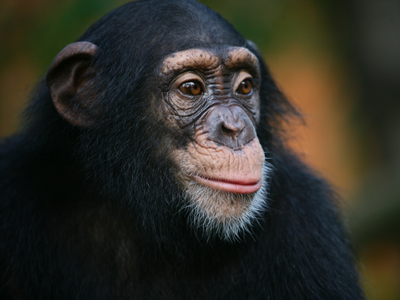
Ask the AI Tutor
Need help with Unit 2 - Making Gametes (H)? Ask our AI Tutor!
AI Tutor - Lucy
Connecting with Tutor...
Please wait while we establish connection

Chimpanzees have 48 chromosomes in each body cell - humans have 46.
Unit 2 - Making Gametes (H)
This GCSE Biology quiz on making gametes (higher tier) explores meiosis, chromosome halving, and how sperm and egg cells are produced to create genetic variation.
1 .
Mitosis produces cells which are genetically...
different
identical
varied
mutated
This is the type of cell division that occurs to produce cells with the full number of chromosomes
2 .
Meiosis consists of how many cell divisions?
One
Two
Three
Four
This type of cell division forms cells with only half of the genetic information
3 .
Variation takes place as a result of meiosis and is a big advantage of which type of reproduction?
Asexual
Conjugation
Sexual
Replication
If every organism was identical to every other organism of the same species, it is possible that disease or a change in the environment would cause extinction
4 .
Name the process by which the normal chromosome number is restored.
Mitosis
Meiosis
Cloning
Fertilisation
At fertilisation, an egg containing 23 single chromosomes joins with the sperm also containing 23 single chromosomes to form a zygote with 46 chromosomes (23 pairs)
5 .
Meiosis results in cells which are genetically...
identical
different
mutated
the same
It is for that reason that variation of inherited features occurs.
6 .
Human body cells contain how many chromosomes?
One
Two
46
23
Different species have different chromosome numbers. For example, chimpanzees have 48 chromosomes in each body cell
7 .
Meiosis results in how many gametes?
One
Two
Three
Four
In the first stages of meiosis, chromosomes make copies of themselves so (in humans) there are a total of 4 sets of chromosomes in the cell. These then separate, during two sets of cell division, into unpaired chromosomes so meiosis therefore creates 4 gametes.
8 .
Inside gametes, chromosomes are...
paired
single
absent
reduced
Before genetics and cell division was understood, scientists were completely puzzled about what made gametes different to other cells
9 .
Human gametes (eggs or sperm) contain how many chromosomes?
One
Two
23
46
Each gamete contains half of the genetic material of the new individual
10 .
At the start of meiosis, what is replicated?
DNA
Enzymes
Cells
Gametes
Before any cell can divide, the chromosomes replicate and make an extra copy of the DNA. This maintains the chromosome number for the species. One arm of each chromosome duplicates an exact copy forming an X-shaped structure
**Unlimited Quizzes Await You! 🚀**
Hey there, quiz champ! 🌟 You've already tackled today's free questions.
Ready for more?
Ready for more?
🔓 Unlock UNLIMITED Quizzes and challenge yourself every day. But that's
not all...
not all...
🔥 As a Subscriber you can join our thrilling "Daily Streak" against other
quizzers. Try to win a coveted spot on our Hall of Fame Page.
quizzers. Try to win a coveted spot on our Hall of Fame Page.
Don't miss out! Join us now and keep the fun rolling. 🎉
**Unlimited Quizzes Await You! 🚀**
Hey there, quiz champ! 🌟 You've already tackled today's free questions. Ready for more?
🔓 Unlock UNLIMITED Quizzes and challenge yourself every day. But that's not all...
🔥 As a Subscriber you can join our thrilling "Daily Streak" against other quizzers. Try to win a coveted spot on our Hall of Fame Page.
Don't miss out! Join us now and keep the fun rolling. 🎉






